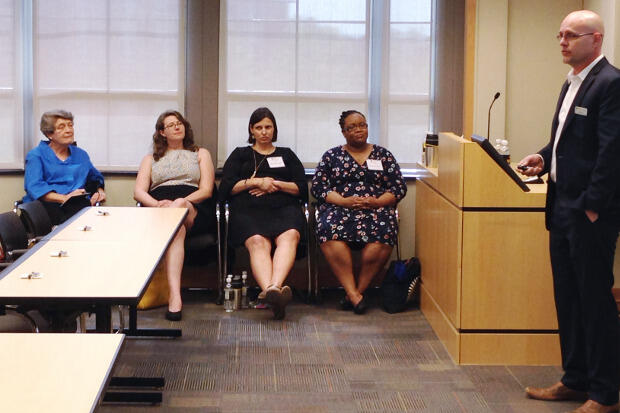
April 11, 2017
Demand drives human trafficking
Share this story
Is human trafficking modern-day slavery? Yes, according to Jessica Willis, executive director of Richmond Justice Initiative.
“It looks different today, of course, than it has in the past, but it is more rampant now than [in] any time in human history,” Willis said during a recent presentation at Virginia Commonwealth University. “So it’s important that it be a matter for all of us to solve together. In fact, slavery is illegal in every country in the world yet … it is the second largest fastest growing crime. So how is this possible?
“It’s a $150 billion industry. In 2013 it was $30 billion, so you can see it growing and … $150 billion per year is five times the combined income of Nike, Google and Starbucks.”
The VCU School of Business’ Department of Supply Chain Management and Analytics hosted Willis and human rights activist Sister Pat Daly last week as part of a sobering In Our Business and in Our Town discussion on “Human Trafficking and Forced Labor in Supply Chains.”
Human trafficking is a problem in which we are all complicit, said Jeff Smith, chair of the supply chain department. In 2015 alone there were almost 150 reported cases in Virginia — 30 in Richmond.
“The U.S. Department of Labor has just identified this past year almost 140 different products that we buy in this country that come from [human trafficking],” Smith said.
The supply chain industry is in a unique position to affect change from the inside, Smith said. Human trafficking uses coercion, fraud and force to have other individuals participate in labor and sex abuse at points along the supply chain. From an organizational perspective, Smith said, managers need to map where they are in the supply chain and work backward to identify points where forced labor may be used.
“We need to train our people on what to do, how to recognize how we can start to see this,” he said. “We need to work with independent auditors, and I say independent because that gives you the ability to actually think about this and have someone that’s not affiliated with your organization, really taking a good hard look to make sure that your policies are being adhered to. We need to work with our suppliers. This becomes a supply chain issue.
“Think about how we can start to detect these sorts of things so that we can work … to eradicate these kinds of issues.”
Daly, a member of the Tri-State Coalition for Responsible Investment, a coalition of Catholic institutional investors who work with corporations on environmental and social justice issues, has spent 40 years helping companies develop human rights policies.
“The first address of human trafficking in the interfaith community here in the states was around sex trafficking,” she said. “We all know that that’s a very small percentage of international traffic, but it’s still astounding. … How do people get into these positions? What are the horrors that exist that allow this to happen?”
Daly approached large international industries such as oil and energy companies, banks, hotels and airlines to talk about trafficked women and other human rights issues.
“Even high-end hotels were being used for trafficking,” she said. “What we were asking companies to do was just train people. Train them to be able to recognize.”
Her message wasn’t always popular. When Daly was speaking to a group at ExxonMobile — which she took to task for climate matters among other social issues — one person stood up and started screaming, “You know that nun, she’s no Mother Teresa!”
“And I was like, ‘You’ve totally got it, I am no mother Teresa,’” Daly said. “Why? Mother Teresa: brilliant, incredible, passionate. [But] she didn’t ask the question, why are people dying on the streets of Calcutta? We get charity, don’t we? But we’ve got to get justice.”
Smith cites the fishing industry as an example of how trafficking can work. “We’re only four or five layers deep from the moment the fish is caught ’till we actually consume it,” he said.
Working on the fishing boat is expensive and dangerous, so people force others to do it, Smith said. Working in factories that process the fish is not a desirable position so, again, people force others to do it. Benefits from the cheap labor are passed to the consumer.
If no one was looking for cheap products, there would not be a demand for cheap labor.
“That’s a lot of money that’s moving around and that’s the driving force behind most of this. People are using this to make money,” Smith said.
The international trafficking business is interwoven into legal industries and embedded into the supply chain, Willis said.
“This is all about supply and demand,” she said. “If no one was looking for cheap products, there would not be a demand for cheap labor. There is a direct correlation between human trafficking and unchecked consumerism. Or you can say unchecked business practices.”
Subscribe for free to the VCU News email newsletter at http://newsletter.news.vcu.edu/ and receive a selection of stories, videos, photos, news clips and event listings in your inbox every Monday and Thursday.
Subscribe to VCU News
Subscribe to VCU News at newsletter.vcu.edu and receive a selection of stories, videos, photos, news clips and event listings in your inbox.









